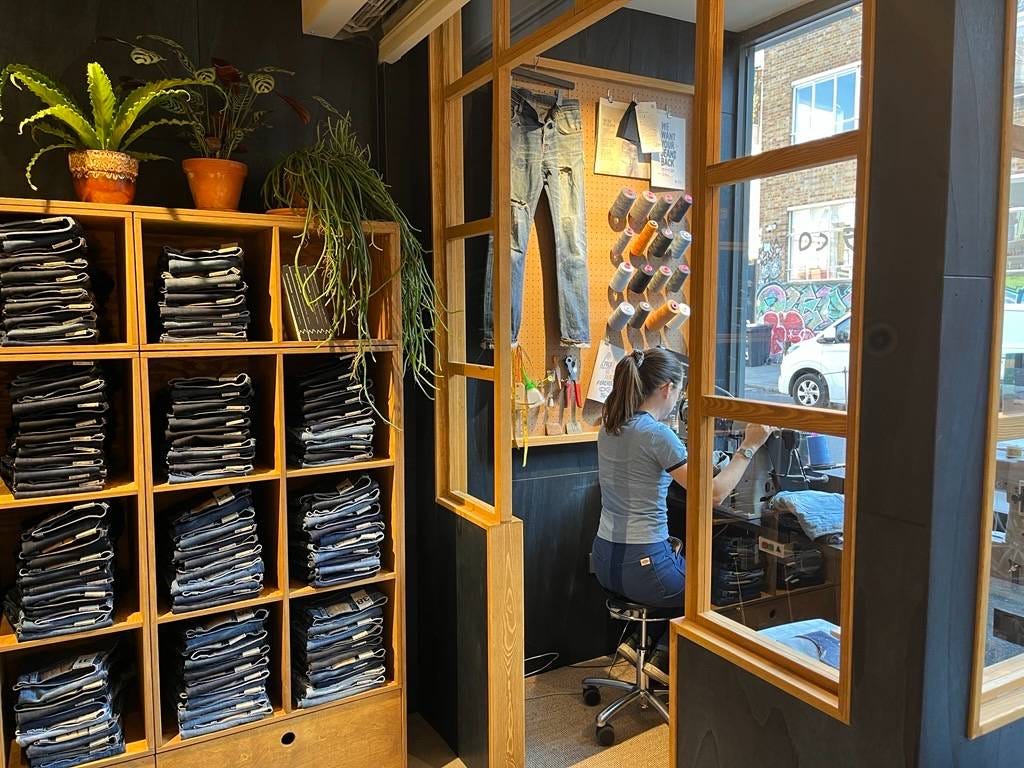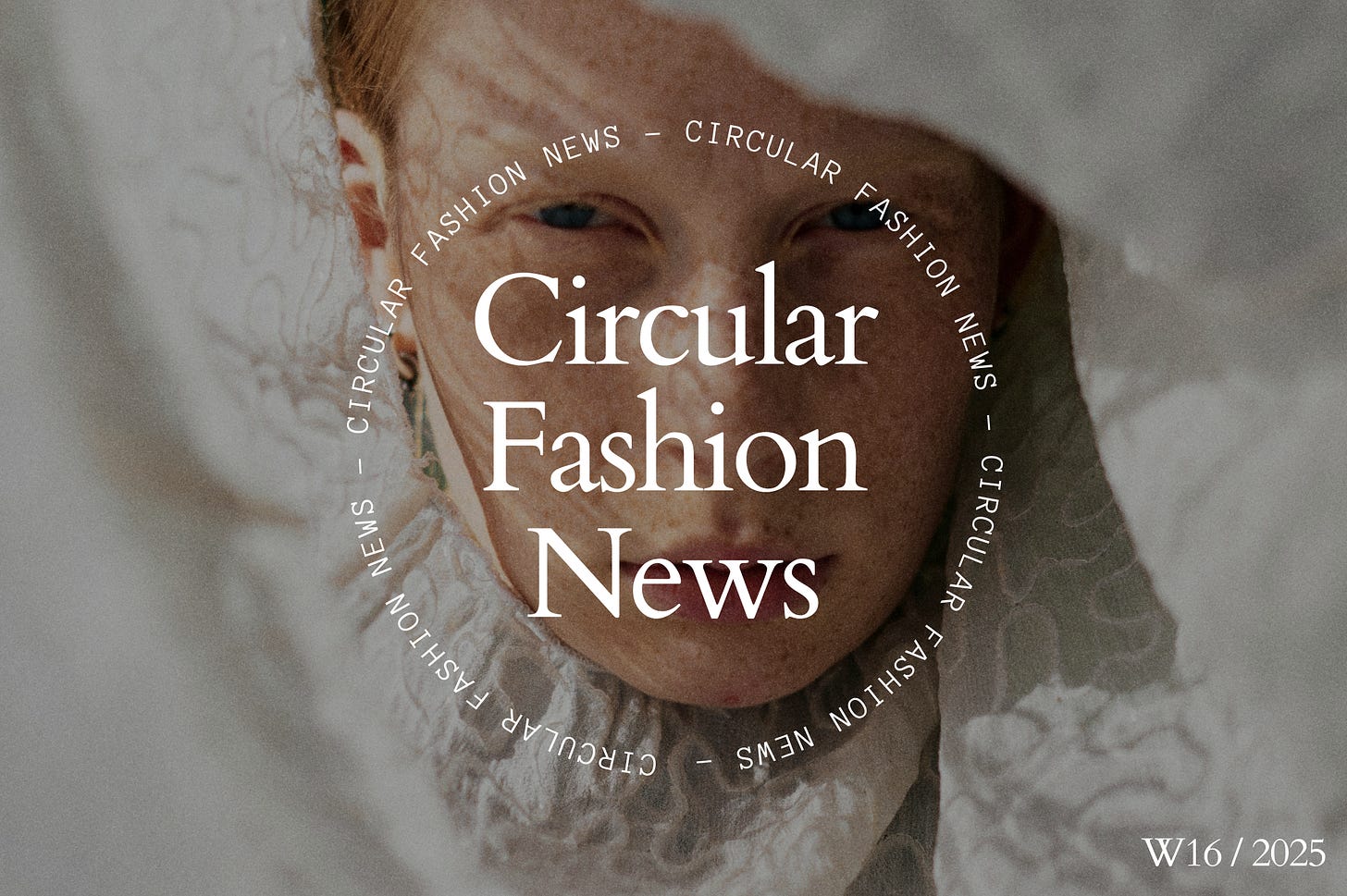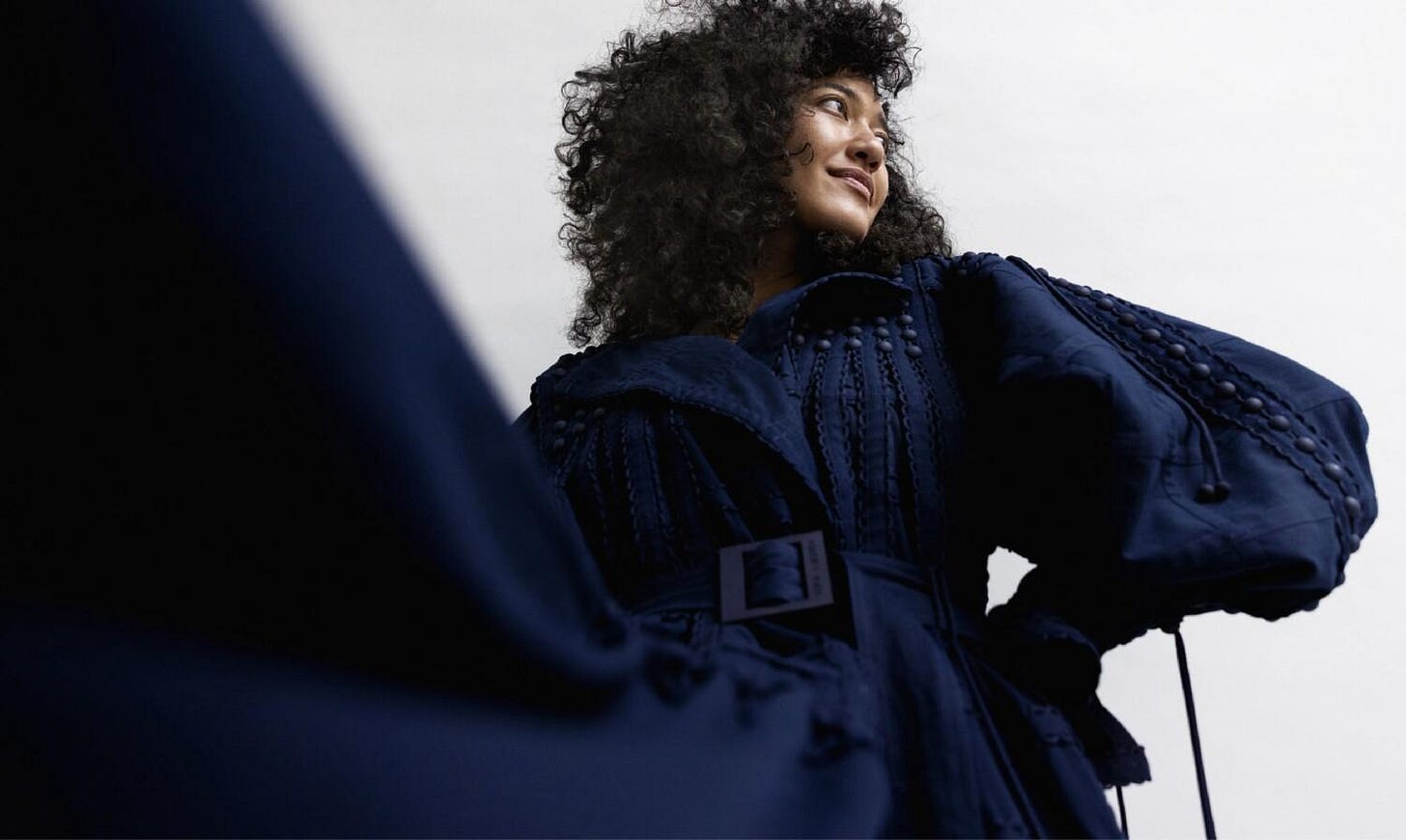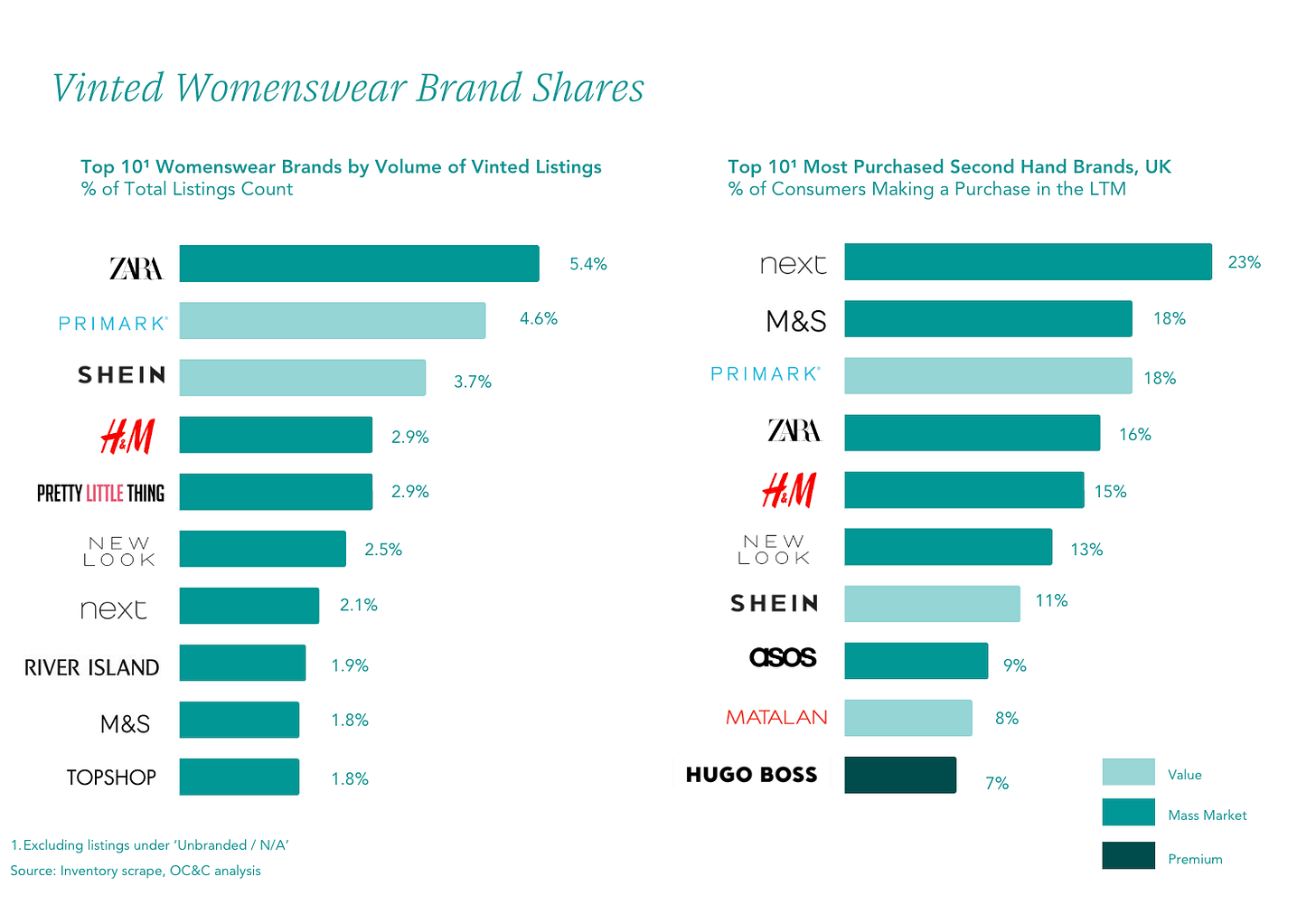Circular Fashion News / Apr 14th: Refiberd wins Ebay circularity award, Faume raises €8 million, surge in textile collection in Sweden, update on Spinnova
Your weekly edit of what has happened in the circular fashion space. In this week's edit, highlight is on news and events in the textile recycling space - plus a new section debut!
Welcome to reading a weekly recap of circular fashion news! Some of last week’s events and highlights in the circular fashion industry included:
Refiberd, a sorting solution for textile-to-textile recycling, winning the Ebay Circularity award
60% surge in textile collection in Sweden following the new EU recycling mandate
Spinnova Group announcing organizational restructuring at both Spinnova and Woodspin
Resale solution provider Faume raising €8 million in Series A funding
Prefer audio over written format? Listen to this newsletter in a podcast format here.
The EU Textiles Ecosystem Platform was launched
The European Commission launched the EU Textiles Ecosystem Platform, a digital space designed to facilitate collaboration and knowledge sharing among stakeholders in the textiles ecosystem.
In the platform, you can find the latest news, studies, and research about the European textile industry, as well as community pages where you can discuss specific topics with other members.
The platform is open to all stakeholders active in the textiles ecosystem, or anyone who cares about making the textile industry more sustainable.
—> Read more and discover the platform
Refiberd has won the Ebay Circularity award, other finalists included Sojo, Shopfront and MOOT
Refiberd, a sorting solution for textile-to-textile recycling, has been announced as the winner of the Circular Fashion Award and was awarded $300k from Ebay Ventures, the investment arm of Ebay.
Other finalists, each of whom had won initial rounds in the competition at the national level, included Sojo from the UK, Shopfront from Australia, and MOOT from Germany.
What does Refiberd do?
Refiberd tackles one of the biggest challenges in textile recycling: the vast majority of discarded textiles still end up in landfills or incinerators due to inefficient sorting technologies. In earlier editions of Circular Fashion News, we’ve explored solutions like near-infrared (NIR)–based technologies for textile identification.
Refiberd, however, is pushing this approach further with significantly enhanced accuracy. Their advanced sorting technology combines hyperspectral imaging with artificial intelligence to precisely identify the fiber composition of textile waste. While standard NIR sensors might not be able to detect blended fabrics or trace fibers, Refiberd’s system can identify even materials present in less than 2% of a fabric’s structure.
Startup advancing material identification in textiles and plastics secures £1.5 million seed funding
Continuing on the topic of material identification: Matoha, a UK-based company specializing in portable devices for identifying textiles and plastics, has raised £1.5 million seed funding.
Matoha's flagship product, FabriTell, is a compact device that utilizes near-infrared (NIR) reflectance spectroscopy combined with machine learning algorithms to rapidly identify textile materials.
Whereas Refiberd’s solution is most likely aimed at developing industrial-scale recycling operations, Matoha focuses on providing cost-effective, portable devices suitable for on-site material identification, catering to businesses seeking quick and accessible solutions.
Although Matoha’s solution may not detect all blended or trace materials, it effectively recognizes common materials such as cotton, polyester, polyamide, viscose, wool, silk, elastane, acrylic, and acetate, as well as the 17 most common two-component blends.
60% surge in textile collection in Sweden following the new EU recycling mandate
At the beginning of 2025, it became mandatory for EU member states to implement separate textile collection systems. In Sweden, this regulation has already made a visible impact: textile collection volumes increased by 60% in January and February compared to the same period last year, leading to overwhelmed recycling centers across the country.
With limited infrastructure for sorting and processing, Sweden exports most of the collected textiles abroad, primarily to Lithuania, where the materials are sorted, reused, or incinerated. In some cases, such as in the Kiruna municipality of Sweden, all of the collected textiles are incinerated. The primary challenge lies in the labor-intensive and costly nature of textile sorting, which remains a bottleneck for scaling circular textile systems.
The first recycled viscose facility has opened in China
Chinese cellulose fiber manufacturer Yibin Grace has launched the country’s first recycled textile dissolving pulp facility. The plant uses both post-industrial and post-consumer textile waste from supply chain partners to produce dissolving pulp, which can be used in various man-made cellulosic fiber (MMCF) products.
The facility’s initial production capacity is 1,500 tons per year, with plans to scale up to 60,000 tons annually by 2027. For comparison, Yibin Grace’s total production capacity for virgin MMCF materials, including viscose staple fiber, viscose filament yarn, and lyocell, is 450,000 tons per year.
A report mapping textile waste and leftover materials at textile producer Rivatex reveals the biggest waste sources
A report mapping textile waste and leftover materials at textile producer Rivatex’s factory, conducted to support the implementation of the UPMADE production system, provides a valuable overview of where textile production waste originates in textile factories.
In 2022, Rivatex generated about 600 tonnes of textile waste and fabric leftovers. Nearly all of this waste was leftover fabric, which accounted for 91% of the total amount, while textile waste (such as cutting scraps) accounted for just 9%.
Of the leftover fabric, the largest portion was high-quality grade A fabric, which was either sold or reused internally at the factory.
To get a grasp of the overall amount of waste generated at Rivatex factory during one year: 600 tonnes of textile waste corresponds to about 3 million t-shirts.
Update of Spinnova: organizational restructuring at Spinnova and Woodspin
In the Q1 recap of Circular Fashion News, we covered the challenges Spinnova has faced following its partner Suzano’s decision not to continue investing in their joint venture, Woodspin.
Now, Spinnova has announced the start of change negotiations to restructure both Spinnova and Woodspin.
With these negotiations, Spinnova aims to align its operations with the company’s current stage of development and a shifting business environment, targeting annual savings of approximately €2.6 million.
French resale solution provider Faume raises €8 million in Series A funding
Faume, a French third-party resale solution provider for premium and luxury fashion brands, has secured €8 million in Series A funding to fuel its European expansion, with a focus on the UK and Italy.
In addition to European expansion and continuing to help more luxury brands with fashion resale, Faume also plans to launch a “Dynamic Pricing AI” to help brands offer more competitive resale prices compared to marketplaces.
Current brand partners using Faume’s resale solution include for example Sandro, Lacoste, Isabel Marant, and Victoria Beckham.

Report urges fashion brands to adapt as resale claims a growing share of the market
A report by OC&C highlights the rapid growth of secondhand fashion and its impact on primary sales, urging fashion brands to rethink their strategies to maintain market share. By 2029, secondhand purchases are expected to make up 10% of total fashion spending. As one key recommendation, the report encourages brands to embrace resale rather than resist it, whether by building their own resale platforms or partnering with existing ones.
As part of its findings, the report analyzed what is being sold in online fashion resale by examining brand shares of listed and sold products on Vinted. The data shows that the majority of Vinted sales come from fast fashion brands such as Zara, Next, M&S, H&M, and Primark.
Fashion Revolution Week is coming up - and Mend in Public Day takes place on April 26th. Fashion Revolution Week runs from April 22nd to 27th, and on April 26th, Mend in Public Day invites everyone to take a stand. The idea is simple: head into your local community and stitch in protest against disposable fashion. You can find local mending events listed here.
Visa launches UK search for circular fashion creators - As part of its Recycle the Runway initiative, Visa is inviting early-stage fashion entrepreneurs committed to circular practices to apply for a share of £20,000 in grants. Applicants must demonstrate how their design-led business incorporates circular business models aligned with at least one of the 'R's of circular fashion: repair, resale, return, redistribution, rental, or refill.
John Lewis rolls out repair services in all stores - John Lewis initially trialed repair services in five locations. Following positive customer feedback, the retailer has now expanded the offering to all of its stores. The most in-demand services during the trial included minor rip and seam repairs, along with trouser alterations.
Guest in Residence partners with Nigel Xavier for upcycled collection - Gigi Hadid’s brand, Guest in Residence, has partnered with Nigel Xavier for a capsule collection made entirely from upcycled materials. The collection features patchwork designs made from repurposed fabric scraps from previous Guest in Residence pieces. Nigel Xavier is known for his patchwork upcycled designs and won the US series “Next in Fashion” season 2.
Nudie Jeans opens new “repair kiosk” concept in a UK store - Nudie Jeans has opened a new store in the UK which features a “denim kiosk”, a repair workshop offering free repairs on all Nudie Jeans denim.
Blocktexx was awarded with the Banksia National Sustainability Gold Award for textile recycling technology - The Australian company develops a technology for recycling clothes made from mixed polyester and cotton, transforming them into two materials: recycled polyester (PolyTexx) and cellulose (CellTexx) to reuse in new products.
Saie released a curated vintage collection - Curated by the company’s founder, the collection features vintage outdoor pieces, inspired by her childhood spent in nature with her family.
The RealReal partnered with FIT for an upcycled collection - For the second time, The RealReal has partnered with the Fashion Institute of Technology to create an upcycled collection using inventory deemed unfit for resale.

New section! - Bookmarked this week: brands, reads, listens & content worth your time
Welcome to a new section in Circular Fashion News! Each week, I come across interesting brands, initiatives, and other players in the circular fashion space, as well as articles, podcasts, and videos that spark thought or inspire action. They're not always “news,” but they’re definitely worth sharing.
So here it is: a weekly spot for the things that caught my eye. Expect everything from upcycled fashion brands and vintage platforms to deep-dive reads and podcasts.
Discovered
Upcycled fashion brand Elv Denim - Amazingly cool upcycled fashion brand focusing especially on denim, upcycling discarded denim pieces into jeans, shirts, skirts, and jackets. All of their pieces are made from 100% upcycled materials.
Upcycled fashion brand Bettter - Another upcycled fashion brand, utilizing previously worn garments and luxury deadstock to new garments. Bettter was born out of the belief that all the clothes we will ever need have already been produced (and overproduced), and from the determination to upcycle fashion waste on an industrial scale to create high-fashion clothing. The brand was featured in Canadian Elle last week, read it here.
Vintage Clothing Guides - A website packed with detailed resources for vintage fashion lovers: guides on identifying brand tags and labels from different eras to help understand the history and value of vintage pieces, fee calculators to compare what various resale platforms charge, and a weight calculator to estimate how much different types of clothing weigh. A true go-to for anyone buying or selling vintage!
Read & Listened
Short read: How learning to sew changed my relationship to clothing by Taylor Moore - This piece reflects on the journalist’s journey of learning to sew, and how such a small act can still have a big impact in shifting attitudes toward fast fashion and constant consumption.
Substack: Intro to mending sweaters + roundup of DIY & professional repair resources - My favourite Substack read of the week! Anne’s Circular Knitting Journey is one of my favourite publications, documenting her journey in knitting sweaters from scrap yarns. This piece is a great collection of resources for mending your clothes, either by yourself or by professionals.
Podcast: Your AI-powered secondhand buying assistant, Reinventing Capitalism - Interview with Evoléna de Wilde d'Estmael, the co-founder and CEO of Faircado, an app aggregating secondhand products from multiple marketplaces. In the podcast, Evoléna shares the mission behind the company, how the product has been built, and what was their approach to opening new markets.
That is all from last week, let’s get back to it next Monday! In the meantime, let’s continue the discussion in the comments or on Linkedin.
xx Tiina



















